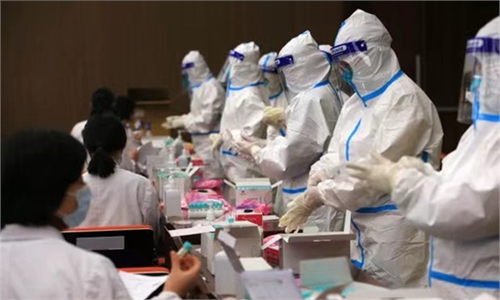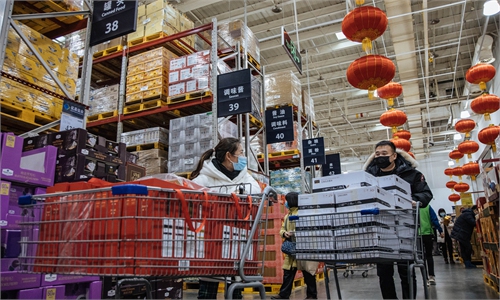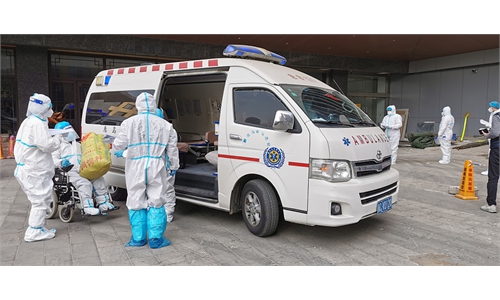Infection risks remain during holiday despite 'phased victory' of zero new domestic case after 53 days

Customers are seen at a shopping mall in Qiaoxi District of Shijiazhuang, north China's Hebei Province, Feb. 5, 2021. Many commercial complexes and shopping malls in Shijiazhuang resumed operation in an orderly manner on Friday.Photo:Xinhua
For the first time in nearly two months, the Chinese mainland reported zero new domestic COVID-19 cases in daily reports on Sunday since the latest outbreaks. Chinese health experts declared phased victory in this round of the battle against coronavirus but warned that infection risks remain during the Spring Festival holidays.The phased victory is good news for the upcoming gatherings and family reunions for the Spring Festival, but the guard must not be lowered, especially in previously virus-stricken places, which need more time to announce virus-free, observers said.
The Chinese mainland reported no new domestic cases on Sunday, according to the National Health Commission on Monday, 53 days after latest round of outbreaks. No new deaths or suspected domestic cases were reported, either.
One asymptomatic case was found in Dongyang, East China's Zhejiang Province, and all close contacts have been put under quarantine and tested negative for COVID-19, local authorities said.
After one local infection was reported in Southwest China's Sichuan Province on December 17, 2020, the country was dragged into the latest battle against the coronavirus in multiple places. So far, the recent flare-up involved 2,071 domestic confirmed patients.
North China's Hebei Province, hardest-hit in this winter outbreak, has reported zero new cases for four consecutive days. Gaocheng district in Hebei capital Shijiazhuang, the only high-risk area in the province, was downgraded to medium-risk on Monday. Highways and railways in the city resumed operations, and people from low-risk areas are allowed to commute through Shijiazhuang with a green health code meaning they were not exposed in high-risk regions.
Zhejiang Province also announced on Monday to allow local residents to return to their hometowns within the province, only with the provision of green health codes, removing previous requirements of negative COVID-19 test results or daily health monitoring.
Netizens cheered the relaxation and some wondered if it means people can enjoy the Spring Festival more freely, with observers noting it as a sign of a phased victory.
Wang Guangfa, a respiratory expert at Peking University First Hospital, told the Global Times that this is not the time to lower the guard as multiple places in China are yet to prove virus-free. It normally takes twice the length of an incubation period to see whether there are unidentified infections as silent cases may take longer to develop symptoms, Wang explained.
Wang reminded people to protect themselves during the Chinese New Year, which may involve shopping in crowds and handling cold-chain products.
The silent carrier found in Zhejiang is also a reminder that infection risks are always there and society must try hard to close infection loopholes during the Spring Festival holidays, health experts noted.
The silent carrier was not found among people under quarantine, meaning if such a person was not identified timely and walked around freely during the holidays, it would be a great threat to epidemic control, they said.
Chinese Vice Premier Sun Chunlan called for loopholes in epidemic prevention in rural areas to be plugged during the Spring Festival. It is urgent to overcome the shortcomings in rural areas, and promptly handle sporadic cases and cluster infections to avoid the virus from spreading.
The National Health Commission also urged villages and townships to enhance testing capabilities, including arranging testing vans.
An official surnamed Hu from a village in Hebei Province told the Global Times that grassroots officials at his village are required to live in the dormitories of the government during the holiday so that they could respond to potential virus resurgence efficiently.
Hu is confident in the village's anti-epidemic arrangement, but noted risks still exist, such as silent carriers, the flow of migrant workers and the villagers' habit of seeking doctors at small clinics.
It was normal for villagers to visit each other and attend parties during the holidays, and "it is very difficult" to make them observe the village's ban on all social gatherings during the Spring Festival. Village officials would patrol every day to inspect any improper gatherings, Hu said.
The Global Times found regions across China have made efforts to prevent epidemic resurgence. Lanzhou, Northwest China's Gansu Province, for example, has streamlined the diagnosis procedures at all hospitals and launched emergency epidemic drills.




